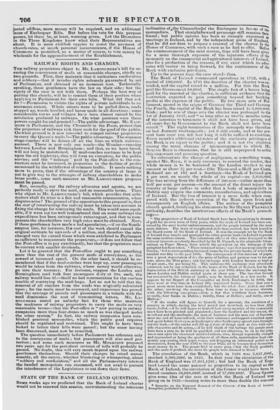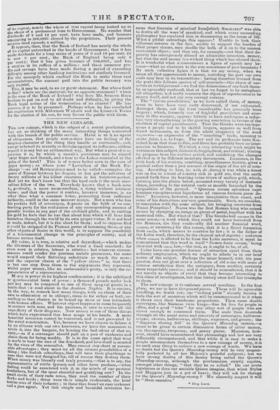STATE OF THE BANK OF IRELAND QUESTION.
SOME weeks ago we predicted that the Bank of Ireland charter would not be renewed this session, notwithstanding the notorious
monopolists. That straightforward personage still remains theit friend ; but public opinion has been so strongly expressed le meetings in Ireland, and by the independent press of Eng1an4; that he did not dare to propose a renewal of the charter to the the commencement of the next session, time will have been given monopoly on the commercial and agricultural interests of Ireland; House of Commons, with such a case as he had to offer. Before inclination ofAthe Chancellor :of the Exchequer in favour of the Bank with exclusive privileges.
also for a production of the reasons, if any exist which its adao.
cates will ventur . to bring forward, for the continuance of the for a more thorough exposure of the injurious effects of the
Up to the present time the case stands thus.
The Bank of Ireland commenced operations in 1782, with a capital of 600,000/. In 1791 the duration of the charter was ex.
tended, and the capital raised to a million. For this the Bank = paid the Government 60,000/. The single fact of a bonus being paid for the renewal of the charter, is sufficient evidence that the institution expected to gain something beyond fair banking
profits at the expense of the public. By two more acts of Par'. !lament, passed in the reigns of GEORGE the Third and Gamlen
the Fourth. the capital of the Bank has been raised to 3,000,0001.
Irish ; and by one of these acts the charter was prolonged to the 1st of January 1837, and " so long after as twelve months notice of the intention to terminate it shall not have been given, and all sums due by Government to the Bank shall not have been repaid."* The right termination of the monopoly was therefore on last January twelvemonth : yet it still exists, and at the pre- sent hour none can tell how long it will be suffered to continue.
Every month's additional oxi,tence of the exclusive privileges of the flank is an injury to the public ; and it is not I he slightest among the many charges of mismanagement to which Mr. SPRING RICE is obnoxious, that he is still unprepared to settle this important and pressing question.
To substantiate the charge of negligence, or something worse, against Mr. RICE, it is only necessary to remind the reader, that while money is to be borrowed in the London market to any
amount at about :3,-} per cent.— (the Three-and-a-Half per Cents. Reduced are at 102 and a fraction)—the Bank of Ireland gets 4 per cent. on nearly the whole of its capital—on 2,850,0001. The loss arising from the difference of interest—rather more than half per cent, per annum—is the amount of the direct injury the country at large suffers in order that a body of monopolists in Dublin may cripple the commerce, manufactures, and agriculture of Ireland. But the loss of interest is a mere trifle when com- pared with the indirect operation of the Bank upon Irish and consequently on English affairs. The author of the pamphlet already quoted, fortifying his statements by Sir HENRY PARNELL'S authority, describes the mischievous effects of the 'Bank's proceed- ings— " The proprietors of Bank of Ireland Stock have been luxuriating in showers of gold for an even term of forty years, while the trade of Ireland has been con vulsed by the most fearful embarrassments, and the people tortured by the most acute distress. The train of complicated evils thus evolved, has been traced to the Board.room of the Bank of Ireland. It was the example set by the Bank of Ireland that taught and prompted the other private banks in Ireland to pursue the same reckless course. The calamitous effects of this utter disregard to the national interests ate clearly described by Sir H. Parnell, in the aditnirable Obser- vations on Paper Money, from which the quotation on the titlepage of thia pamphlet has been taken. • These increased issues,' says that unexceptionable au. thortty, led to corresponding increased issues by the private banks, of which the number was fifty in the year 1804. The consequence of this increase of paper, was a great depteciation of it ; the price of bullion and guineas rose to ten per cent, above the Mint price ; and the exchange with London became as high as 18 per cent., the par being 81. This unfavourable exchange was afterwards corrected, not by any reduction in the issues of the Bank of Ireland, but by the depreciation of the Britieh currency in the year 1810, when the exchange be- tween London and Dublin settled again at about par. The loss that Ireland has sustained by the failure of bank's, may be described in a few words. It appears by the Report of the Committee on Irish Exchanges, in 1804, that there were at that time in Ireland fifty registered banks. Since that year a great many more have been established ; but the whole hate failed, one after the other, involving the country, from time to time, in immense distress, with the following exceptions—first, a few that withdrew from business; seeondly, four banks in Dublin ; thirdly, three at Belfast ; and lastly, one at Mallow.'
" If the reader will figure to himself, for a moment, the condition of a country in which, during the brief period just described, no less than fifty banks foiled—if he will figure to himself how every member of the community must have been pinched and plundered—how the landlord and the tenant, tht metchant and the mechanic, the man of business and the man out of business, must one and all have suffered, while their substance and support vanished again and again before their eyes, as bankruptcy after bankruptcy spread ruin through- out the land,—if the reader will fill up a state of things such as this with suit- able characters and fit action,—if he will think of the feelings the people must have been a prey to, he will be qualified, and not otherwise, to sit in the judg- ment-seat upon the chartered nuschiefmakers, who, though repeatedly charged and reproached as being the producers of all these evils, nevertheless kept eon- stantly augmenting their paper issues, anti drugging an infatuated public to ite destruction, from the year 1797 to the year 1825, soLly because they themselves made money by it. The people bled at every pore,—but the Bank profited; and the more it profited, the more thc people were doomed to bleed."
The circulation of the Bank, which in 1808 was 2,827,0004, reached 6,309,3004 in 1825. In that year the circulation of the Bank of England was 17,091,1201.; but had the Bank of Eng- land issued the same amount in proportion to its capital as the Bank of Ireland, the circulation of the former would have been in round numbers 30,000,000/. instead of 17,000,000/. These figures give some idea of the rate at which the Bank of Ireland W29 going on in 1825—issuing notes to more than double the amount • Remarks on the Proposed Renewal of the Charter f the Bank of Ireland, Pamphlet, published by HOOPER. of its capital, nearly the whole of that capital being locked up in the shape of a permanent loan to Government. No wonder that dividends of 9 and 10 per cent. have been made, and bonuses atssuating to 200,000/. shared by the proprietors. Their present surplus fund exceeds a million. It appears, then, that the Bank of Ireland has nearly the whole as its capital untouched in the hands of Government ; that it has wade dividends for a long series of years of 9 and 10 per cent. (it ss now 9 per cent., the Bank of England being only 8 per cent.); that it has givenbonuses of 200,000/., and has a surplus in its coffers of a million : and these immense pro- fits and savings have been made during a period of exceeding difficulty among other banking institutions not similarly favoured. For the monopoly which enabled the Bank to make these vast accumulations, the amount paid into the public treasury was
only 60,000/.
This, it may be said, in an ex parte statement. But whose fault is that ? where are the materials for an opposite statement ? where is the case of the Bank of Ireland? why does Mr. SPRING RICE hesitate to put an end to all doubt and difficulty, by giving the Bank legal notice of the termination of its charter ? Ile has reasons, it is to be presumed. Perhaps when he has concluded his negotiation with Alderman WATSON and the Limerick Tories for the election of his son, he may favour the public with them.



























 Previous page
Previous page